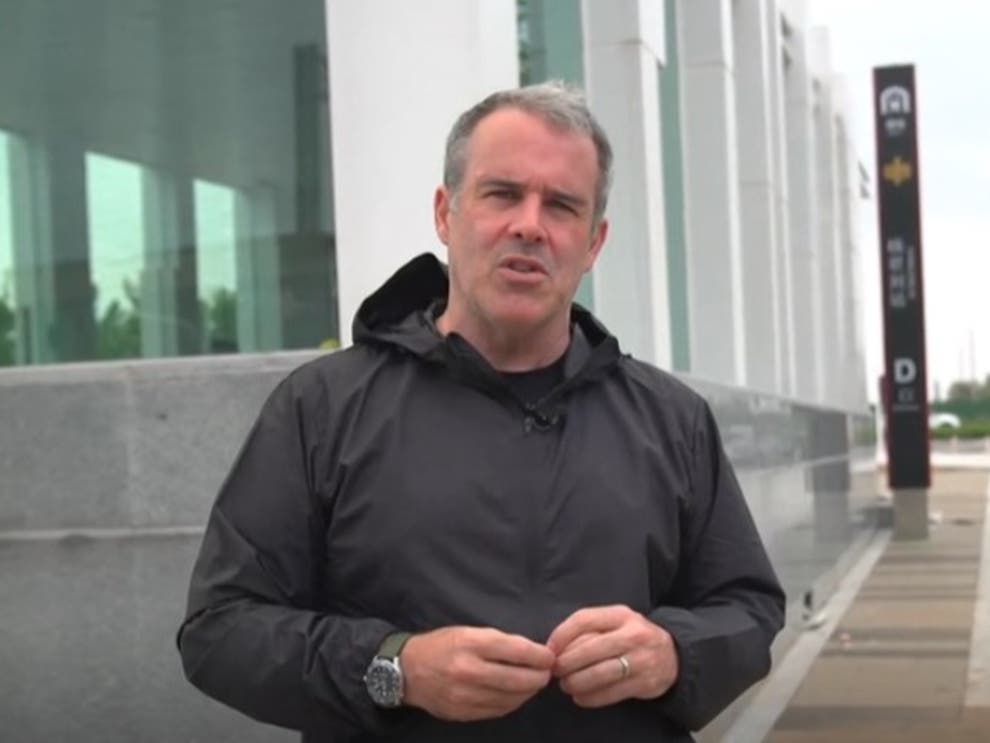China’s government has been urged to intervene after a faction of the ruling Chinese Communist Party (CCP) put out a social media post, asking members of the public to report the whereabouts of a BBC News crew.
The comments allegedly included death threats against the broadcaster’s team who were in the Henan province covering the area’s recent floods, which have so far been confirmed to have killed at least 71 people.
Journalists from other organisations were approached by “angry” citizens looking for the BBC team as a result, the broadcaster said in a statement, before asking the government to take “immediate action”.
“Over the weekend a social media post by a part of the Chinese Communist Party called on citizens to post comments on the whereabouts of a BBC team covering the flood in Henan province. The public comments below the post included deaths threats against our team,” the statement read.
“Journalists from other media organisations reporting in Henan were subsequently confronted by an angry crowd looking for the BBC team.”
It concluded: “There must be immediate action by the Chinese government to stop these attacks which continue to endanger foreign journalists.”
China’s notoriously strict social media laws make it difficult for non-Chinese citizens or residents to view profiles from outside the country. However, in a lengthy thread of tweets, the Foreign Correspondents’ Club of China (FCCC) said the call-to-action against BBC reporters came from Henan’s Communist Youth League.
The group is said to have asked its 1.6 million followers on Chinese social media site Weibo to report the whereabouts of, specifically, the BBC’s China correspondent Robin Brant.
“Rhetoric from organisations affiliated with China’s ruling Communist Party directly endangers the physical safety of foreign journalists in China and hinders free reporting,” the FCCC, which is the professional association of Beijing-based journalists reporting on China for global audiences, said.
It also revealed details of the reporters erroneously harassed by residents from Zhengzhou, the capital city of Henan, on their hunt to find Mr Brant.
A crowd of people allegedly “jostled” Mathias Boelinger, a German TV reporter on assignment for Deutsche Welle, and Alice Su, a reporter for the Los Angeles Times, near a flooded underground market. They had mistaken Mr Boelinger for the BBC’s Mr Brant.
People “grabbed [Mr Boelinger’s] camera and clothes and briefly prevented both outlets from leaving the site. Since then, the China-based staff for the BBC, LA Times and others have received death threats and intimidating messages and calls,” the FCCC said.
Ms Su said they were in an area where underground markets had flooded and many shopkeepers were “distressed about insufficient government help”.
“There were many other ppl in Zhengzhou and the surrounding worse-hit areas who were open and even eager to talk about the destruction and difficulties they’re facing,” Ms Su tweeted. “But this crowd seemed really angry and eager just to tell the foreigners off.”
Describing the incident on Twitter, DW’s Mr Boelinger said he was pushed and yelled at for “smearing China”, and that it became apparent the crowd believed he was Mr Brant.
“What I did not know at the time was that a manhunt was on after [Mr Brant],” Mr Beolinger wrote. “There is a vicious campaign against the BBC News in nationalistic circles and state media.”
Various reports from inside China and Hong Kong suggest Mr Brant was targeted due to a controversial report that aired on Friday, in which he questioned government policies after almost a year’s worth of rain dropped around Zhengzhou in three days, overwhelming streets and subway tunnels – leading to a dozen people dying on a train carriage.
“We don’t know why they were left so vulnerable,” Mr Brant said in the report, adding that Beijing had warned other local governments to examine their own weather preparedness and metro regulations.
They were also reportedly instructed not to “take an exaggeratedly sorrowful tone or hype or draw connections to past events” without permission, the website said.
Hostility towards foreign media has increased in China over the last couple of years, particularly since the outbreak of the coronavirus pandemic and the revelation of China’s Uyghur Muslim detention centres.
China’s foreign ministry has repeatedly criticised what it calls “fake news” from Western news outlets. One BBC journalist, John Sudworth, left the country this year citing threats of legal action, obstruction and intimidation but China said at the time it had never threatened Mr Sudworth.
In the past 18 months alone, though, some 16 US journalists have been expelled from China and at least four journalists – including Mr Sudworth and two Australian journalists – were forced to flee.
Concluding its statement on Twitter, the FCCC said it “is disappointed and dismayed at the growing hostility against foreign media in China, a sentiment underpinned by rising Chinese nationalism sometimes directly encouraged by Chinese officials and official entities”.

